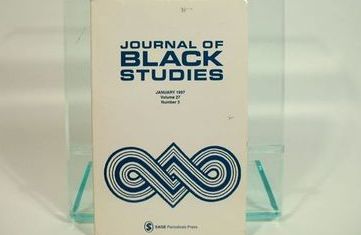
Above: Old cover of Journal of Black Studies
(Photo: black-ephemera.com).
By Tadias Staff
Published: Tuesday, March 3, 2009.
New York (Tadias) – According to the Journal of Black Studies’, an article penned by Ethiopian-born Ayele Bekerie ranks number 3 among the journal’s 50 Most-Frequently Read Articles during the month of January 2009. The following are the top five. You can read the complete list at Journal of Black Studies’ website.
Per JBS: “Most-read rankings are recalculated at the beginning of the month and are based on full-text and pdf views.”
1. Shauna B. Wilson, William D. McIntosh, Salvatore P. Insana
Dating Across Race: An Examination of African American Internet Personal Advertisements
Georgia Southern University
The purpose of this study was to determine the factors associated with Black Americans’ dating preferences. Two hundred profiles of Black individuals in the United States (100 men and 100 women) were accessed on the Internet dating site Match.com. Fourteen demographic and personal variables were correlated with willingness to date Whites, Hispanics, Native Americans, and Asians, as well as other Blacks. Blacks willing to interracially date tended to be male, young, and/or attractive, tended to smoke, abstain from exercise, and either definitely or possibly wanted children. Willingness to date intraracially was related to living in any geographical region except the West, being a nonsmoker, and being sure of either wanting or not wanting children. Factors unrelated to dating preference included having or not having children, education, political standpoint, religion, body type, and drinking habits. Both mate selection theory and exchange theory were applied in interpreting results.
(Jul 01, 2007; 37: 964-982)
2. Deborah F. Atwater
Senator Barack Obama: The Rhetoric of Hope and the American Dream
The Pennsylvania State University
This article offers a brief discussion of the origin of Senator Barack Obama’s rhetoric of hope. Specifically, it discusses how Senator Obama creates a contemporary vision of an inclusive America and the American dream by examining his 2004 Keynote Democratic National Convention Speech and his latest book, The Audacity of Hope. In doing so, one gets an idea of who the man is, what his core values are, and why these values are important to him and to us as a society.
(Nov 01, 2007; 38: 121-129).
3. Ayele Bekerie
The Ancient African Past and the Field of Africana Studies
Cornell University
The ancient African past refers to deeds and events of African peoples documented or narrated through oral or written traditions or other means from the time of human beginnings until the modern period. Africana studies is a transdisciplinary field of study pertaining to intellectual traditions and practices of African and African-descended peoples. The ancient African past is valued in the field of Africana studies. The value given to ancient Africa within the field may serve as a critical conceptual challenge to the colonial history of Africa. This article calls for an Africana philosophy of history, that is, a vision and interpretive scheme to critically reflect on the historical field of concerns. It seeks an intellectual endeavor to recapture historical spaces, thereby leading not only to autonomous readings of ancient African history but also to engaging in the development of explanatory paradigms for the field.
(Jan 01, 2007; 37: 445-460).
4. Ron Walters
Barack Obama and the Politics of Blackness
University of Maryland
This analysis assesses the debate over the relevance of the strength of Barack Obama’s “Blackness.” Defined as the cultural cues in his personal identity, his “Blackness” exists as a modulating factor in his capacity to attract support from potential Black voters. Yet the link between his cultural identity and the representation of Black interests is complicated by the emergence of his campaign in the center of the American electorate and the structural requirements of fund-raising and the interests projected by White voters. The campaigns of other Black presidential candidates posed no such problems because they emerged from the Black community at the margins of the American electorate. Therefore, the author concludes that although cultural identity is important, the ultimate strength of Obama’s appeal to Black voters is vested in the effectiveness with which he resolves the center position of his campaign with the interests and expectations of Black voters.
(Sep 01, 2007; 38: 7-29).
5. Ama Mazama
The Barack Obama Phenomenon
Read more.

























